Fix "local variable referenced before assignment" in Python


Introduction
If you're a Python developer, you've probably come across a variety of errors, like the "local variable referenced before assignment" error. This error can be a bit puzzling, especially for beginners and when it involves local/global variables.
Today, we'll explain this error, understand why it occurs, and see how you can fix it.
The "local variable referenced before assignment" Error
The "local variable referenced before assignment" error in Python is a common error that occurs when a local variable is referenced before it has been assigned a value. This error is a type of UnboundLocalError , which is raised when a local variable is referenced before it has been assigned in the local scope.
Here's a simple example:
Running this code will throw the "local variable 'x' referenced before assignment" error. This is because the variable x is referenced in the print(x) statement before it is assigned a value in the local scope of the foo function.
Even more confusing is when it involves global variables. For example, the following code also produces the error:
But wait, why does this also produce the error? Isn't x assigned before it's used in the say_hello function? The problem here is that x is a global variable when assigned "Hello ". However, in the say_hello function, it's a different local variable, which has not yet been assigned.
We'll see later in this Byte how you can fix these cases as well.
Fixing the Error: Initialization
One way to fix this error is to initialize the variable before using it. This ensures that the variable exists in the local scope before it is referenced.
Let's correct the error from our first example:
In this revised code, we initialize x with a value of 1 before printing it. Now, when you run the function, it will print 1 without any errors.
Fixing the Error: Global Keyword
Another way to fix this error, depending on your specific scenario, is by using the global keyword. This is especially useful when you want to use a global variable inside a function.
No spam ever. Unsubscribe anytime. Read our Privacy Policy.
Here's how:
In this snippet, we declare x as a global variable inside the function foo . This tells Python to look for x in the global scope, not the local one . Now, when you run the function, it will increment the global x by 1 and print 1 .
Similar Error: NameError
An error that's similar to the "local variable referenced before assignment" error is the NameError . This is raised when you try to use a variable or a function name that has not been defined yet.
Running this code will result in a NameError :
In this case, we're trying to print the value of y , but y has not been defined anywhere in the code. Hence, Python raises a NameError . This is similar in that we are trying to use an uninitialized/undefined variable, but the main difference is that we didn't try to initialize y anywhere else in our code.
Variable Scope in Python
Understanding the concept of variable scope can help avoid many common errors in Python, including the main error of interest in this Byte. But what exactly is variable scope?
In Python, variables have two types of scope - global and local. A variable declared inside a function is known as a local variable, while a variable declared outside a function is a global variable.
Consider this example:
In this code, x is a global variable, and y is a local variable. x can be accessed anywhere in the code, but y can only be accessed within my_function . Confusion surrounding this is one of the most common causes for the "variable referenced before assignment" error.
In this Byte, we've taken a look at the "local variable referenced before assignment" error and another similar error, NameError . We also delved into the concept of variable scope in Python, which is an important concept to understand to avoid these errors. If you're seeing one of these errors, check the scope of your variables and make sure they're being assigned before they're being used.

Monitor with Ping Bot
Reliable monitoring for your app, databases, infrastructure, and the vendors they rely on. Ping Bot is a powerful uptime and performance monitoring tool that helps notify you and resolve issues before they affect your customers.
© 2013- 2024 Stack Abuse. All rights reserved.

Top 2 Methods to Solve the ‘Local Variable Referenced Before Assignment’ Error in Python

Table of Contents
When working with Python, encountering the UnboundLocalError can be quite common, especially when dealing with variables that you intend to access globally within a function. This error typically occurs when a variable is referenced before it has been assigned a value within the local scope.
The Problem: Local Variable Referenced Before Assignment
Consider the following example:
Running the code above yields the error:
The critical point here is whether the variable test1 is recognized as global or local. In this case, Python reinterprets test1 as a local variable due to the attempted modification with += , which leads to confusion when it’s referenced before being assigned any value in the local scope.
So how can you resolve this issue effectively without passing test1 as an argument into test_func ? Let’s explore two main methods to approach this.
Method 1: Avoiding Globals
The best practice suggests minimizing the use of global variables. Instead of modifying a global variable directly, consider passing the variable to a function. Here’s how you could rewrite the example to avoid using a global variable entirely:
In this example, test_func takes a parameter x , performs the operation, and returns the modified value, allowing us to keep the variable scope clean.
Method 2: Declaring a Variable as Global
If modifying a global variable within a function is necessary, use the global keyword. Here’s how you can clarify that test1 should be treated as a global variable within test_func :
By using global test1 , you inform Python of your intention to operate on the global instance of test1 , thus eliminating the UnboundLocalError .
Further Alternatives
While the two methods outlined above are the most straightforward solutions, you can also consider using classes to encapsulate your variables and methods, managing state more formally through object-oriented programming. Here’s a simple example:
This alternative approach provides a structured way to manage your variables, improving code readability and maintainability.
FAQs on Top 2 Methods to Solve the ‘Local Variable Referenced Before Assignment’ Error in Python
Q: what is unboundlocalerror in python, q: how can i avoid using global variables in python, q: does using the global keyword affect performance, q: what are the best practices for variable scope in python.
For additional resources on Python programming, you might find W3Schools Python Tutorials and Geeks for Geeks Python Programming useful.
Local variable referenced before assignment in Python
Last updated: Apr 8, 2024 Reading time · 4 min

# Local variable referenced before assignment in Python
The Python "UnboundLocalError: Local variable referenced before assignment" occurs when we reference a local variable before assigning a value to it in a function.
To solve the error, mark the variable as global in the function definition, e.g. global my_var .

Here is an example of how the error occurs.
We assign a value to the name variable in the function.
# Mark the variable as global to solve the error
To solve the error, mark the variable as global in your function definition.
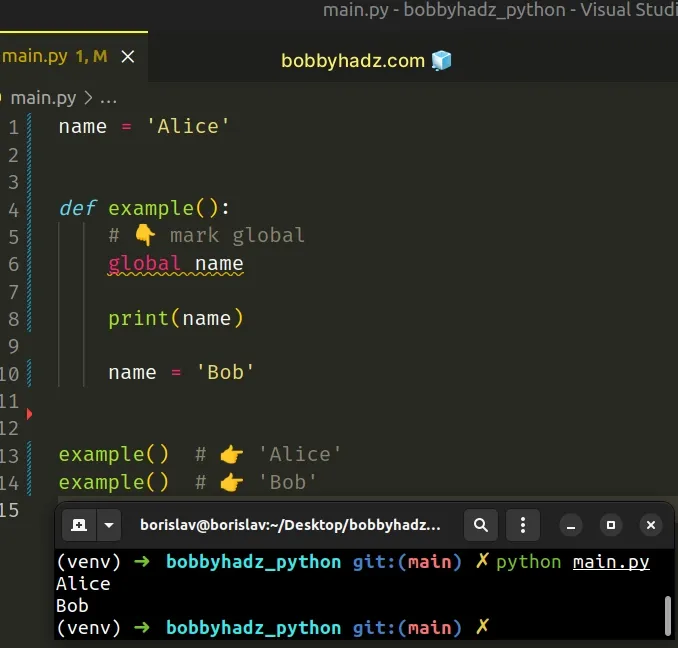
If a variable is assigned a value in a function's body, it is a local variable unless explicitly declared as global .
# Local variables shadow global ones with the same name
You could reference the global name variable from inside the function but if you assign a value to the variable in the function's body, the local variable shadows the global one.
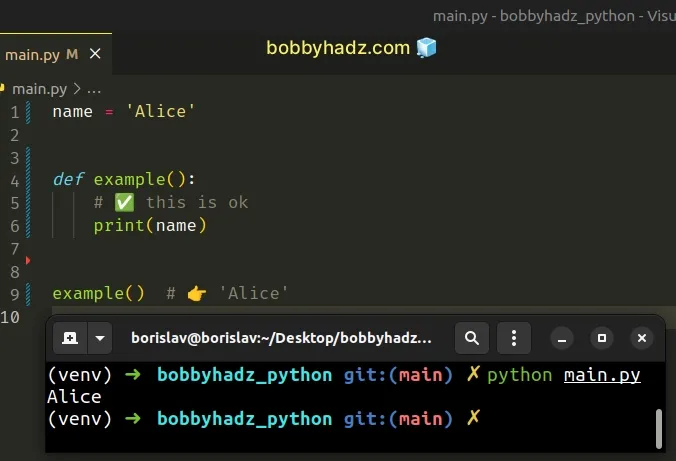
Accessing the name variable in the function is perfectly fine.
On the other hand, variables declared in a function cannot be accessed from the global scope.
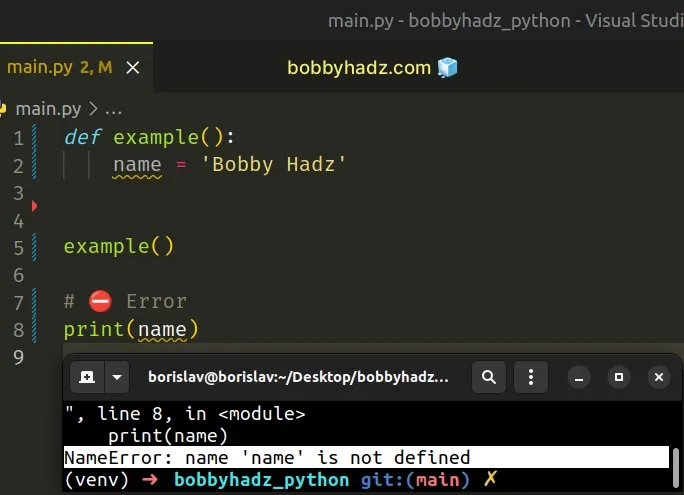
The name variable is declared in the function, so trying to access it from outside causes an error.
Make sure you don't try to access the variable before using the global keyword, otherwise, you'd get the SyntaxError: name 'X' is used prior to global declaration error.
# Returning a value from the function instead
An alternative solution to using the global keyword is to return a value from the function and use the value to reassign the global variable.
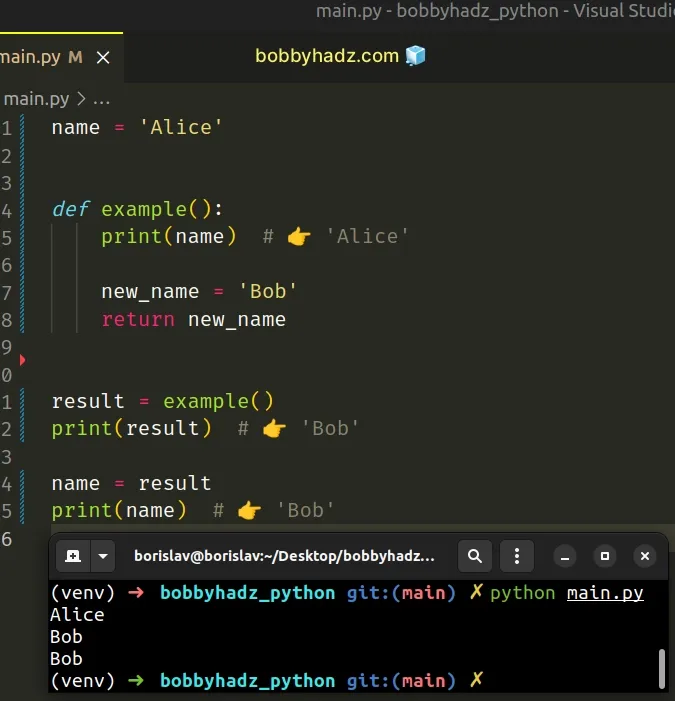
We simply return the value that we eventually use to assign to the name global variable.
# Passing the global variable as an argument to the function
You should also consider passing the global variable as an argument to the function.
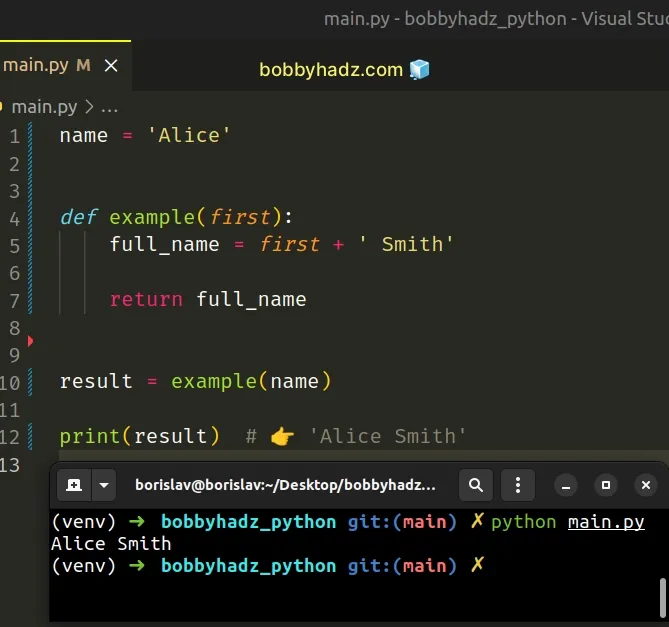
We passed the name global variable as an argument to the function.
If we assign a value to a variable in a function, the variable is assumed to be local unless explicitly declared as global .
# Assigning a value to a local variable from an outer scope
If you have a nested function and are trying to assign a value to the local variables from the outer function, use the nonlocal keyword.
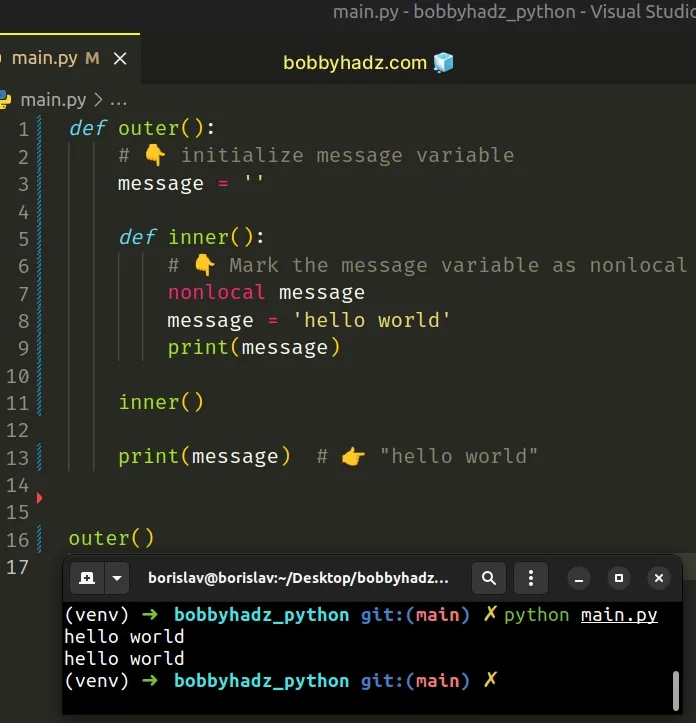
The nonlocal keyword allows us to work with the local variables of enclosing functions.
Had we not used the nonlocal statement, the call to the print() function would have returned an empty string.
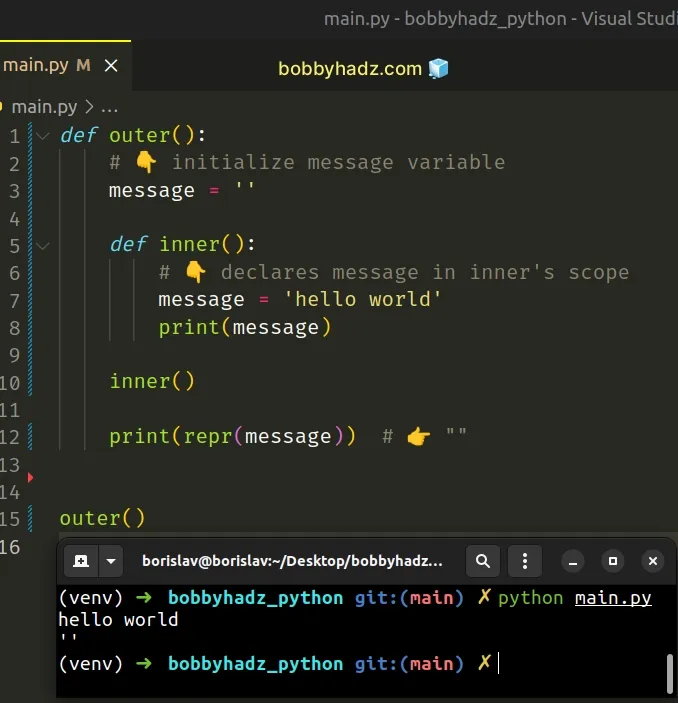
Printing the message variable on the last line of the function shows an empty string because the inner() function has its own scope.
Changing the value of the variable in the inner scope is not possible unless we use the nonlocal keyword.
Instead, the message variable in the inner function simply shadows the variable with the same name from the outer scope.
# Discussion
As shown in this section of the documentation, when you assign a value to a variable inside a function, the variable:
- Becomes local to the scope.
- Shadows any variables from the outer scope that have the same name.
The last line in the example function assigns a value to the name variable, marking it as a local variable and shadowing the name variable from the outer scope.
At the time the print(name) line runs, the name variable is not yet initialized, which causes the error.
The most intuitive way to solve the error is to use the global keyword.
The global keyword is used to indicate to Python that we are actually modifying the value of the name variable from the outer scope.
- If a variable is only referenced inside a function, it is implicitly global.
- If a variable is assigned a value inside a function's body, it is assumed to be local, unless explicitly marked as global .
If you want to read more about why this error occurs, check out [this section] ( this section ) of the docs.
# Additional Resources
You can learn more about the related topics by checking out the following tutorials:
- SyntaxError: name 'X' is used prior to global declaration

Borislav Hadzhiev
Web Developer

Copyright © 2024 Borislav Hadzhiev
- Python Basics
- Interview Questions
- Python Quiz
- Popular Packages
- Python Projects
- Practice Python
- AI With Python
- Learn Python3
- Python Automation
- Python Web Dev
- DSA with Python
- Python OOPs
- Dictionaries
UnboundLocalError Local variable Referenced Before Assignment in Python
Handling errors is an integral part of writing robust and reliable Python code. One common stumbling block that developers often encounter is the "UnboundLocalError" raised within a try-except block. This error can be perplexing for those unfamiliar with its nuances but fear not – in this article, we will delve into the intricacies of the UnboundLocalError and provide a comprehensive guide on how to effectively use try-except statements to resolve it.

What is UnboundLocalError Local variable Referenced Before Assignment in Python?
The UnboundLocalError occurs when a local variable is referenced before it has been assigned a value within a function or method. This error typically surfaces when utilizing try-except blocks to handle exceptions, creating a puzzle for developers trying to comprehend its origins and find a solution.
Why does UnboundLocalError: Local variable Referenced Before Assignment Occur?
below, are the reasons of occurring "Unboundlocalerror: Try Except Statements" in Python :
Variable Assignment Inside Try Block
Reassigning a global variable inside except block.
- Accessing a Variable Defined Inside an If Block
In the below code, example_function attempts to execute some_operation within a try-except block. If an exception occurs, it prints an error message. However, if no exception occurs, it prints the value of the variable result outside the try block, leading to an UnboundLocalError since result might not be defined if an exception was caught.
In below code , modify_global function attempts to increment the global variable global_var within a try block, but it raises an UnboundLocalError. This error occurs because the function treats global_var as a local variable due to the assignment operation within the try block.
Solution for UnboundLocalError Local variable Referenced Before Assignment
Below, are the approaches to solve "Unboundlocalerror: Try Except Statements".
Initialize Variables Outside the Try Block
Avoid reassignment of global variables.
In modification to the example_function is correct. Initializing the variable result before the try block ensures that it exists even if an exception occurs within the try block. This helps prevent UnboundLocalError when trying to access result in the print statement outside the try block.
Below, code calculates a new value ( local_var ) based on the global variable and then prints both the local and global variables separately. It demonstrates that the global variable is accessed directly without being reassigned within the function.
In conclusion , To fix "UnboundLocalError" related to try-except statements, ensure that variables used within the try block are initialized before the try block starts. This can be achieved by declaring the variables with default values or assigning them None outside the try block. Additionally, when modifying global variables within a try block, use the `global` keyword to explicitly declare them.
Similar Reads
- Python Programs
- Python Errors
Improve your Coding Skills with Practice
What kind of Experience do you want to share?
How to fix UnboundLocalError: local variable 'x' referenced before assignment in Python
by Nathan Sebhastian
Posted on May 26, 2023
Reading time: 2 minutes

One error you might encounter when running Python code is:
This error commonly occurs when you reference a variable inside a function without first assigning it a value.
You could also see this error when you forget to pass the variable as an argument to your function.
Let me show you an example that causes this error and how I fix it in practice.
How to reproduce this error
Suppose you have a variable called name declared in your Python code as follows:
Next, you created a function that uses the name variable as shown below:
When you execute the code above, you’ll get this error:
This error occurs because you both assign and reference a variable called name inside the function.
Python thinks you’re trying to assign the local variable name to name , which is not the case here because the original name variable we declared is a global variable.
How to fix this error
To resolve this error, you can change the variable’s name inside the function to something else. For example, name_with_title should work:
As an alternative, you can specify a name parameter in the greet() function to indicate that you require a variable to be passed to the function.
When calling the function, you need to pass a variable as follows:
This code allows Python to know that you intend to use the name variable which is passed as an argument to the function as part of the newly declared name variable.
Still, I would say that you need to use a different name when declaring a variable inside the function. Using the same name might confuse you in the future.
Here’s the best solution to the error:
Now it’s clear that we’re using the name variable given to the function as part of the value assigned to name_with_title . Way to go!
The UnboundLocalError: local variable 'x' referenced before assignment occurs when you reference a variable inside a function before declaring that variable.
To resolve this error, you need to use a different variable name when referencing the existing variable, or you can also specify a parameter for the function.
I hope this tutorial is useful. See you in other tutorials.
Take your skills to the next level ⚡️
I'm sending out an occasional email with the latest tutorials on programming, web development, and statistics. Drop your email in the box below and I'll send new stuff straight into your inbox!
Hello! This website is dedicated to help you learn tech and data science skills with its step-by-step, beginner-friendly tutorials. Learn statistics, JavaScript and other programming languages using clear examples written for people.
Learn more about this website
Connect with me on Twitter
Or LinkedIn
Type the keyword below and hit enter
Click to see all tutorials tagged with:
How to Solve Error - Local Variable Referenced Before Assignment in Python
- Python How-To's
- How to Solve Error - Local Variable …
Check the Variable Scope to Fix the local variable referenced before assignment Error in Python
Initialize the variable before use to fix the local variable referenced before assignment error in python, use conditional assignment to fix the local variable referenced before assignment error in python.
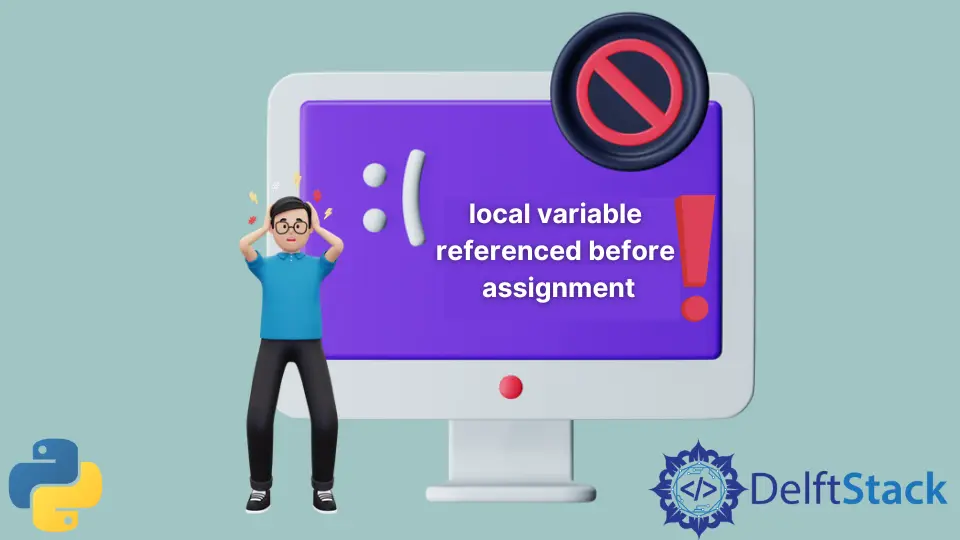
This article delves into various strategies to resolve the common local variable referenced before assignment error. By exploring methods such as checking variable scope, initializing variables before use, conditional assignments, and more, we aim to equip both novice and seasoned programmers with practical solutions.
Each method is dissected with examples, demonstrating how subtle changes in code can prevent this frequent error, enhancing the robustness and readability of your Python projects.
The local variable referenced before assignment occurs when some variable is referenced before assignment within a function’s body. The error usually occurs when the code is trying to access the global variable.
The primary purpose of managing variable scope is to ensure that variables are accessible where they are needed while maintaining code modularity and preventing unexpected modifications to global variables.
We can declare the variable as global using the global keyword in Python. Once the variable is declared global, the program can access the variable within a function, and no error will occur.
The below example code demonstrates the code scenario where the program will end up with the local variable referenced before assignment error.
In this example, my_var is a global variable. Inside update_var , we attempt to modify it without declaring its scope, leading to the Local Variable Referenced Before Assignment error.
We need to declare the my_var variable as global using the global keyword to resolve this error. The below example code demonstrates how the error can be resolved using the global keyword in the above code scenario.
In the corrected code, we use the global keyword to inform Python that my_var references the global variable.
When we first print my_var , it displays the original value from the global scope.
After assigning a new value to my_var , it updates the global variable, not a local one. This way, we effectively tell Python the scope of our variable, thus avoiding any conflicts between local and global variables with the same name.
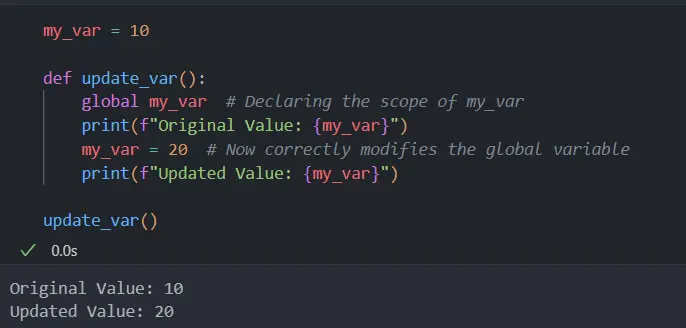
Ensure that the variable is initialized with some value before using it. This can be done by assigning a default value to the variable at the beginning of the function or code block.
The main purpose of initializing variables before use is to ensure that they have a defined state before any operations are performed on them. This practice is not only crucial for avoiding the aforementioned error but also promotes writing clear and predictable code, which is essential in both simple scripts and complex applications.
In this example, the variable total is used in the function calculate_total without prior initialization, leading to the Local Variable Referenced Before Assignment error. The below example code demonstrates how the error can be resolved in the above code scenario.
In our corrected code, we initialize the variable total with 0 before using it in the loop. This ensures that when we start adding item values to total , it already has a defined state (in this case, 0).
This initialization is crucial because it provides a starting point for accumulation within the loop. Without this step, Python does not know the initial state of total , leading to the error.
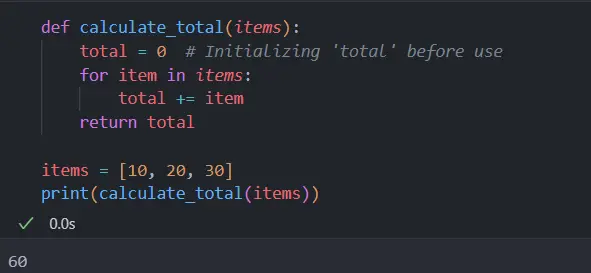
Conditional assignment allows variables to be assigned values based on certain conditions or logical expressions. This method is particularly useful when a variable’s value depends on certain prerequisites or states, ensuring that a variable is always initialized before it’s used, thereby avoiding the common error.
In this example, message is only assigned within the if and elif blocks. If neither condition is met (as with guest ), the variable message remains uninitialized, leading to the Local Variable Referenced Before Assignment error when trying to print it.
The below example code demonstrates how the error can be resolved in the above code scenario.
In the revised code, we’ve included an else statement as part of our conditional logic. This guarantees that no matter what value user_type holds, the variable message will be assigned some value before it is used in the print function.
This conditional assignment ensures that the message is always initialized, thereby eliminating the possibility of encountering the Local Variable Referenced Before Assignment error.
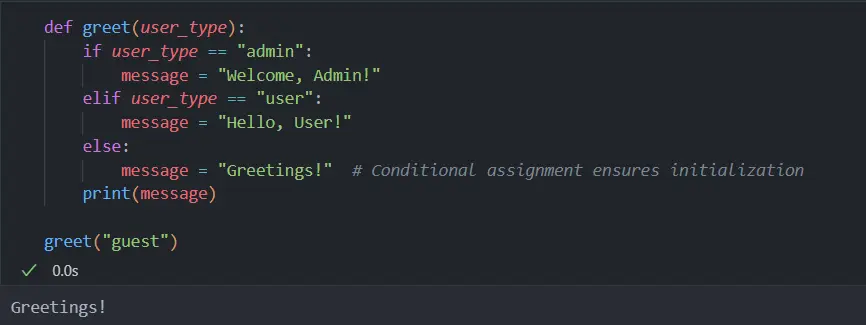
Throughout this article, we have explored multiple approaches to address the Local Variable Referenced Before Assignment error in Python. From the nuances of variable scope to the effectiveness of initializations and conditional assignments, these strategies are instrumental in developing error-free code.
The key takeaway is the importance of understanding variable scope and initialization in Python. By applying these methods appropriately, programmers can not only resolve this specific error but also enhance the overall quality and maintainability of their code, making their programming journey smoother and more rewarding.
[SOLVED] Local Variable Referenced Before Assignment

Python treats variables referenced only inside a function as global variables. Any variable assigned to a function’s body is assumed to be a local variable unless explicitly declared as global.
Why Does This Error Occur?
Unboundlocalerror: local variable referenced before assignment occurs when a variable is used before its created. Python does not have the concept of variable declarations. Hence it searches for the variable whenever used. When not found, it throws the error.
Before we hop into the solutions, let’s have a look at what is the global and local variables.
Local Variable Declarations vs. Global Variable Declarations
![python local variable referenced before assignment [Fixed] typeerror can’t compare datetime.datetime to datetime.date](https://www.pythonpool.com/wp-content/uploads/2024/01/typeerror-cant-compare-datetime.datetime-to-datetime.date_-300x157.webp)
Local Variable Referenced Before Assignment Error with Explanation
Try these examples yourself using our Online Compiler.
Let’s look at the following function:

Explanation
The variable myVar has been assigned a value twice. Once before the declaration of myFunction and within myFunction itself.
Using Global Variables
Passing the variable as global allows the function to recognize the variable outside the function.
Create Functions that Take in Parameters
Instead of initializing myVar as a global or local variable, it can be passed to the function as a parameter. This removes the need to create a variable in memory.
UnboundLocalError: local variable ‘DISTRO_NAME’
This error may occur when trying to launch the Anaconda Navigator in Linux Systems.
Upon launching Anaconda Navigator, the opening screen freezes and doesn’t proceed to load.
Try and update your Anaconda Navigator with the following command.
If solution one doesn’t work, you have to edit a file located at
After finding and opening the Python file, make the following changes:
In the function on line 159, simply add the line:
DISTRO_NAME = None
Save the file and re-launch Anaconda Navigator.
DJANGO – Local Variable Referenced Before Assignment [Form]
The program takes information from a form filled out by a user. Accordingly, an email is sent using the information.
Upon running you get the following error:
We have created a class myForm that creates instances of Django forms. It extracts the user’s name, email, and message to be sent.
A function GetContact is created to use the information from the Django form and produce an email. It takes one request parameter. Prior to sending the email, the function verifies the validity of the form. Upon True , .get() function is passed to fetch the name, email, and message. Finally, the email sent via the send_mail function
Why does the error occur?
We are initializing form under the if request.method == “POST” condition statement. Using the GET request, our variable form doesn’t get defined.
Local variable Referenced before assignment but it is global
This is a common error that happens when we don’t provide a value to a variable and reference it. This can happen with local variables. Global variables can’t be assigned.
This error message is raised when a variable is referenced before it has been assigned a value within the local scope of a function, even though it is a global variable.
Here’s an example to help illustrate the problem:
In this example, x is a global variable that is defined outside of the function my_func(). However, when we try to print the value of x inside the function, we get a UnboundLocalError with the message “local variable ‘x’ referenced before assignment”.
This is because the += operator implicitly creates a local variable within the function’s scope, which shadows the global variable of the same name. Since we’re trying to access the value of x before it’s been assigned a value within the local scope, the interpreter raises an error.
To fix this, you can use the global keyword to explicitly refer to the global variable within the function’s scope:
However, in the above example, the global keyword tells Python that we want to modify the value of the global variable x, rather than creating a new local variable. This allows us to access and modify the global variable within the function’s scope, without causing any errors.
Local variable ‘version’ referenced before assignment ubuntu-drivers
This error occurs with Ubuntu version drivers. To solve this error, you can re-specify the version information and give a split as 2 –
Here, p_name means package name.
With the help of the threading module, you can avoid using global variables in multi-threading. Make sure you lock and release your threads correctly to avoid the race condition.
When a variable that is created locally is called before assigning, it results in Unbound Local Error in Python. The interpreter can’t track the variable.
Therefore, we have examined the local variable referenced before the assignment Exception in Python. The differences between a local and global variable declaration have been explained, and multiple solutions regarding the issue have been provided.
Trending Python Articles
![python local variable referenced before assignment [Fixed] nameerror: name Unicode is not defined](https://www.pythonpool.com/wp-content/uploads/2024/01/Fixed-nameerror-name-Unicode-is-not-defined-300x157.webp)

IMAGES
VIDEO
COMMENTS
Developers often encounter the UnboundLocalError Local Variable Referenced Before Assignment error in Python. In this article, we will see what is local variable referenced before assignment error in Python and how to fix it by using different approaches.
File "weird.py", line 5, in main. print f(3) UnboundLocalError: local variable 'f' referenced before assignment. Python sees the f is used as a local variable in [f for f in [1, 2, 3]], and decides that it is also a local variable in f(3). You could add a global f statement: def f(x): return x.
Learn what causes this error and how to fix it with initialization or global keyword. Also, understand the concept of variable scope and the difference with NameError.
UnboundLocalError: local variable 'test1' referenced before assignment. The critical point here is whether the variable test1 is recognized as global or local. In this case, Python reinterprets test1 as a local variable due to the attempted modification with += , which leads to confusion when it’s referenced before being assigned any value in ...
Learn how to fix the error when a local variable is used before being assigned in a function. See examples, explanations and alternative solutions using global, return or nonlocal keywords.
What is UnboundLocalError Local variable Referenced Before Assignment in Python? The UnboundLocalError occurs when a local variable is referenced before it has been assigned a value within a function or method.
If a local does not have a definition before an assignment, the Python interpreter does not know what to do, so it throws this error. The solution here is to add. global feed to your function (usually near the top) to indicate to the interpreter that the feed variable is not local to this function.
Learn why this error occurs when you reference a variable inside a function without assigning it a value, and how to resolve it with different variable names or parameters. See an example code and the best solution to avoid confusion.
Use Conditional Assignment to Fix the local variable referenced before assignment Error in Python. Conditional assignment allows variables to be assigned values based on certain conditions or logical expressions.
This error message is raised when a variable is referenced before it has been assigned a value within the local scope of a function, even though it is a global variable. Here’s an example to help illustrate the problem: